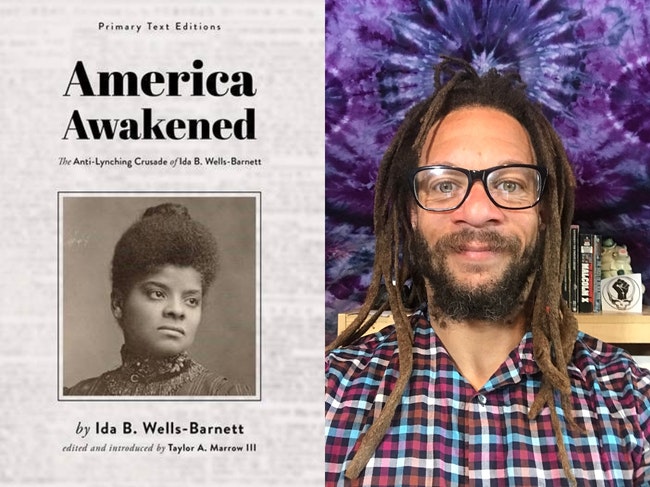 Chemeketa historian Taylor Marrow III, right, and his forthcoming edition of Ida B. Wells anti-lynching journalism. The book will be published Sept. 1 by Chemeketa Press. (Courtesy/Chemeketa Press)
Chemeketa historian Taylor Marrow III, right, and his forthcoming edition of Ida B. Wells anti-lynching journalism. The book will be published Sept. 1 by Chemeketa Press. (Courtesy/Chemeketa Press)
When Taylor Marrow III teaches American history, he makes sure his students learn about Ida B. Wells.
The Chemeketa Community College instructor said Wells, an activist and investigative journalist who documented lynchings of African-Americans and advocated for women’s suffrage and civil rights, tied together many concerns of the American progressive era, a period of social reform and advocacy around the turn of the 20th century.
“She’s a great model for this whole host of things that are unique about that time period,” Marrow said.
Despite the significance of her work and widespread influence during her life, Wells’ work has been little more than a footnote in many American history texts. Her own writings, which were pivotal in awakening northerners to the horrors of lynching in the American South, are in the public domain but haven’t been republished in over 20 years, Marrow said.
In class, Marrow lectures about Wells but doesn’t assign students to read her work because published copies are often prohibitively expensive or difficult to find.
That will change Sept. 1, when Chemeketa Press publishes “America Awakened: the Anti-Lynching Crusade of Ida B. Wells-Barnett,” a new edition of Wells’ journalism edited and introduced by Marrow.
He’s hosting a Facebook Live event Thursday, July 16 from 2-4 p.m. discussing Wells’ work, the history of lynching and how both tie into current discussions about policing in Black communities.
Marrow began work on the project last spring, well before the police killing of George Floyd reignited the Black Lives Matter movement and a push to address racism across the U.S. Wells’ work, he said, shows “how little valued African-American life has been throughout the course of U.S. history.
“As a Black person it’s something I’ve always known,” he said.
His students who aren’t Black are typically shocked to learn about how widespread and brutal lynchings were in the U.S., he said.
“It’s easy for people to forget how violent racism really is and how African-Americans have been the victim of white racist violence,” he said. Lynchings in the 19th and 20th century had widespread support from the white community, including authority figures who often encouraged or declined to prosecute perpetrators.
Wells was among the first Americans to speak about how race and gender intersect for Black women, Marrow said. She wrote about how white women would often claim they were raped by Black men to avoid the social stigma of a consensual relationship, a claim that often led to lynchings.
“She was willing to write openly and honestly in her paper, so much that it got burned down in Tennessee,” Marrow said.
Though she advocated temperance and women’s suffrage, she criticized the Women’s Christian Temperance Union for embracing racist stereotypes of Black men as drunken dangers to white women in a bid to draw support from southern white women.
His edition of Wells’ work is the first in a new Chemeketa Press effort to republish original texts in the public domain so they can be used in classes.
The press’ goal is to upend the academic publishing market by making high-quality textbooks affordable and accessible for community college students, with most selling for $40 or less.
Abbey Gaterud, the press’ director, said public domain titles like Wells’ are challenging to use in class even when they’re available free through efforts like Project Gutenberg or Google Books. Those online texts are usually based on scans of physical books and may contain errors from the scanning process and lack footnotes or context to help modern readers.
“It’ll be available and it’ll be searchable but it’s not a very user friendly interface or no one has done an edit on it,” she said.
Gaterud said the press plans to publish about one book per year in the series and has asked faculty to submit proposals.
“This gives us a chance to sort of bring lost gems back up to the surface, things that would help students understand current events or historical context for current events in a way that is a little easier for them to comprehend,” she said.
The book will sell for $14 and can be preordered now on the Chemeketa Press website.
SUPPORT ESSENTIAL REPORTING FOR SALEM – A subscription starts at $5 a month for around-the-clock access to stories and email alerts sent directly to you. Your support matters. Go HERE.
Contact reporter Rachel Alexander: [email protected] or 503-575-1241.

Rachel Alexander is Salem Reporter’s managing editor. She joined Salem Reporter when it was founded in 2018 and covers city news, education, nonprofits and a little bit of everything else. She’s been a journalist in Oregon and Washington for a decade. Outside of work, she’s a skater and board member with Salem’s Cherry City Roller Derby and can often be found with her nose buried in a book.









